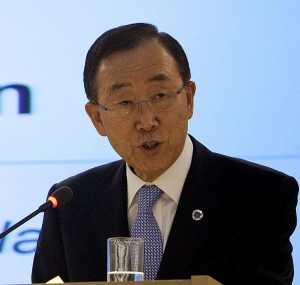MANILA, Philippines—Saying that “gender equality is an essential element in building resilience to disasters,” United Nations (UN) Secretary General Ban Ki-moon’s special representative on disaster risk reduction has urged women to take a more active part in disaster management and planning in their communities.
Margareta Wahlstrom, head of the Geneva-based UN Office for Disaster Risk Reduction, issued the call on Oct. 13, designated by the UN General Assembly as the International Day for Disaster Reduction (IDDR).
Women and Girls: The (In)Visible Force of Resilience” is the theme of this year’s IDDR celebration.
In a statement, a copy of which was furnished the Inquirer by the UN International Strategy on Disaster Reduction regional office in Bangkok, Wahlstrom said, “We need more women volunteering at the community level and we need more women in senior positions as disaster managers.”
“A world in which exposure to disaster is growing exponentially and causing higher economic losses needs all the female help it can get,” she stressed.
According to Wahlstrom, “Ignoring the female voice in a disaster context is foolish in the extreme.”
“We know that some of the most powerful recovery programs in the wake of disasters are driven by women who have survived the most,” she said.
Countries that “do not actively promote the full participation of women in the workforce, education and politics will struggle more than most when it comes to reducing risk and adapting to climate change.”
“Gender equality is thus an essential element of our work in building resilience to disasters and reducing the risk to lives, jobs and property. It is also literally a matter of life and death if women and girls are not empowered to participate in disaster management and planning,” said Wahlstrom.
For his part, Ban Ki-moon said in a statement that “vulnerability to disaster is growing faster than resilience.”
“Disaster risk reduction should be an everyday concern for everybody. Let us all invest today for a safer tomorrow,” he added.
Last year, the Philippines topped the list of countries affected by natural disasters, according to the UNISDR.
“A total of 33 natural disasters ravaged various parts of the country in 2011, resulting in the death of scores of people and the destruction of millions of pesos worth of agricultural produce, key infrastructure and property,” it said, noting that “the worst disaster was Tropical Storm “Sendong” which hit (northern) Mindanao on Dec. 17 and took the lives of 1,430 people.”
